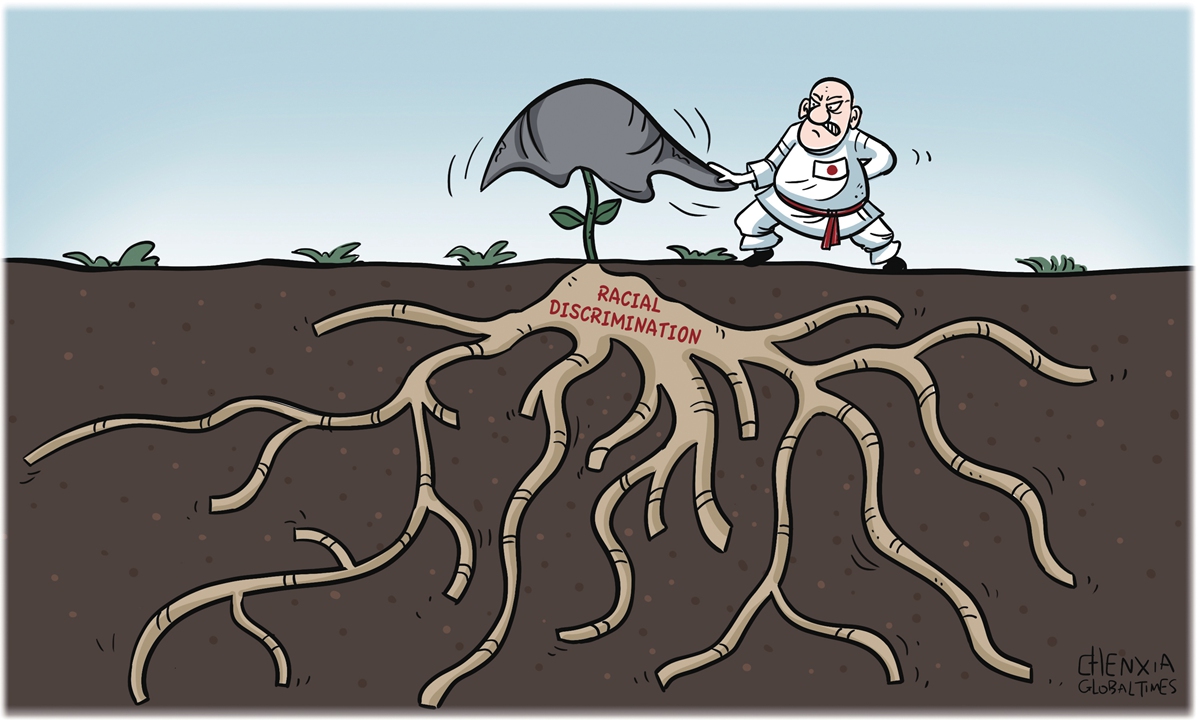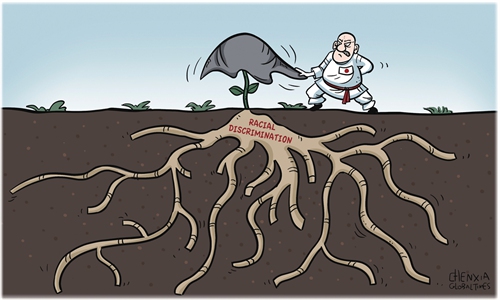
Illustration: Chen Xia/GT
Recently, some Japanese politicians have been playing "human rights" card over China-related affairs. They pushed the House of Representatives to approve a resolution on what it called the "serious human rights situation" in China, to interfere in China's domestic affairs. Such moves are the result of Japan's right-wing anti-China forces catering to the US and the West for political gains. But if we take a close look at Japan and its history, human rights stains can be easily found. Japan is unqualified to accuse China on this issue - it will only make itself a laughing stock in the international community.
The Japanese government has yet to sincerely confess its crimes against humanity committed in many Asian countries. How can it be qualified to accuse others on human rights? After the Meiji Restoration in the 19th century, Japan embarked on the road of aggression and expansion. It invaded many countries in Asia from the mid-19th century to the mid-20th century, turning itself into the main source of war around the world. Japanese invaders were brutal and bloodthirsty. During Japan's invasion of China (1931-45), the Japanese army engaged in chemical and biological warfare, implemented the Three Alls Policy - with the three "alls" being "kill all, burn all, loot all," forced a large number of "comfort women" and committed the Nanjing massacre. Chinese people will never forget those violent crimes.
Japan exercised brutal colonial rule (1895-1945) in many Asian countries, where it slaughtered locals and forced local people into work. This was the nightmare of many Asian people. But after its defeat and surrender in 1945, Japan has never really repented.
The Japanese government has been using many tactics to distort, bleach and de-emphasize its invasion history. It amended textbooks various times to portray its invasion of China as a war between the two countries and the Nanjing massacre as a simple incident. The war dead including 14 "Class A" war criminals are featured in the Yasukuni Shrine, where Japanese politicians frequently visit to pay tribute.
Racial discrimination and systematic xenophobic discrimination are still widespread in Japan. Japanese politicians frequently attack other countries under the name of human rights and claim to uphold justice for so-called persecuted minorities, while ignoring the suffering of the minorities in Japan.
The Ainu, indigenous people of northern Japan particularly Hokkaido, are always treated as "barbarians." The Japanese government carried out a policy of compulsory assimilation of the Ainu, taking their land, forcing them to learn Japanese, forbidding them keeping their traditional culture, and restricting their lifestyle that featured fishing and hunting. The Ainu's culture was destroyed with only a small number of people remaining that could speak their mother tongue. Now in Japan, the systemic discrimination against the Ainu is deep-rooted. Ainu children are bullied and mocked due to their unique physical feature. The Ainu cannot get equal opportunities in employment as well as marriage.
Okinawa Prefecture was founded in 1879 during the Meji era. The policy of assimilation was adopted on the islands to force the Ryukyu people to deny their own culture. During WWII, the islands were treated as a chess piece, where the fight between the Japanese army and US troops caused more than 100,000 deaths among innocent locals. After the war, the US controlled the islands and built military bases on the land forcibly taken from locals. Today, on this land that accounts for only 0.6 percent of Japan's territory there are 31 US military bases. Local people have suffered from the US stationed troops: crimes including rape, noise, and pollution. Protests are commonly seen in Okinawa with people appealing for a reduction in number of US military bases. But the Japanese government has been reluctant to respond properly. The average income, college enrollment rate, and formal employment rate are all below the average level on the main islands.
Meanwhile, immigrants are under discrimination. Now there are about 3 million immigrants in Japan. The obviously cultural difference has triggered Japanese prejudice and discrimination. Some immigrants cannot get fairness in employment due to their nationality - they cannot rent apartments and are banned from entering some public places.
In the Edo era, Japan's system of social hierarchy classified Japanese people in various levels. "Burakumin" were of the lowest social level. These individuals had jobs that were related to death, like butchers or funeral service workers, and thus they were labeled "burakumin." Now in Japan, some Japanese companies refuse to hire people whose ancestors were "burakumin." Discriminative words and graffiti against "burakumin" can be seen in communal facilities. Some Japanese netizens occasionally deliberately released information like where "burakumin" live and their names, showing no respect for their personal safety or privacy.
Japan is criticized for problems like gender inequality, and the Technical Intern Training Program for foreign nationals, which has come under increasing scrutiny for alleged labor rights violations. In March 2021, a Sri Lankan woman died in detention. She was denied medical attention despite persistently complaining of stomach pain and other symptoms since mid-January, months after she was put into custody for overstaying her visa.
To sum up, Japan is not a country with a good human rights record. It has many human rights problems to be solved. However, the Japanese government and some politicians are turning a blind eye and trying to divert conflicts and cater to the US and the West by interfering in other countries' internal affairs. Such acts of turning the tables and wreaking havoc in the world should be opposed and rejected by all countries.
The authors are fellows of the Department for Asia-Pacific Studies at the China Institute of International Studies. opinion@globaltimes.com.cn

